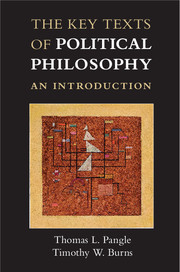Book contents
- Frontmatter
- Dedication
- Contents
- Acknowledgments
- Introduction
- Part I Classical Political Philosophy
- Part II Biblical Political Theology
- Part III Modern Political Philosophy
- Part IV Modernity in Question
- 11 Rousseau’s First and Second Discourses
- 12 Marx and Engels: The Communist Manifesto
- 13 Tocqueville’s Democracy in America
- 14 Nietzsche and His Zarathustra
- Name Index
- Subject Index
- References
13 - Tocqueville’s Democracy in America
Published online by Cambridge University Press: 05 October 2014
- Frontmatter
- Dedication
- Contents
- Acknowledgments
- Introduction
- Part I Classical Political Philosophy
- Part II Biblical Political Theology
- Part III Modern Political Philosophy
- Part IV Modernity in Question
- 11 Rousseau’s First and Second Discourses
- 12 Marx and Engels: The Communist Manifesto
- 13 Tocqueville’s Democracy in America
- 14 Nietzsche and His Zarathustra
- Name Index
- Subject Index
- References
Summary
Alexis de Tocqueville (1805–1859) was raised in a conservative French aristocratic family, but as a young man he became a political liberal. After supporting the revolution of 1830, he was commissioned to go to America to study prison reform. But Tocqueville knew that there were vastly more important things to learn in and about America. He spent nine months traveling the country, getting to know people in many walks of life, questioning everything he saw – as an outsider, who took nothing for granted and looked with wonder at everything. Returning home, he studied his copious notes and many American documents, meditated on all that he had seen and learned, and crafted a treatise meant to teach present and future generations the deepest mainsprings and tendencies of the new kind of democracy he found emerging in the United States.
Tocqueville vs. Marx
Tocqueville lived at the same time as Marx, and like Marx was deeply influenced by the post-Rousseauean critique of the original Enlightenment and its bourgeois individualism. Tocqueville also shared with Marx a conviction that the history of the West in the previous centuries revealed itself as a process through which humanity had been gradually developing toward a final, decisive epoch, whose awesome challenge was coming to clear sight only in the early nineteenth century. Tocqueville parted company with Marx in that he takes with utmost seriousness two things that Marx does not take very seriously at all: God and American democracy.
- Type
- Chapter
- Information
- The Key Texts of Political PhilosophyAn Introduction, pp. 381 - 396Publisher: Cambridge University PressPrint publication year: 2014



